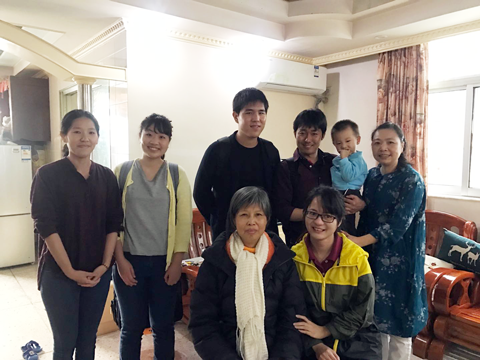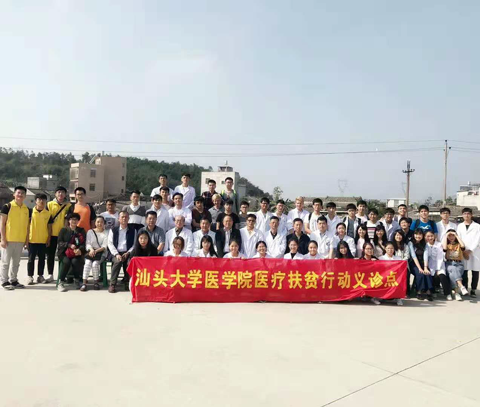International and Domestic exchange
Moe Kida (2nd year student)
After completing my study abroad at Shantou University
I studied abroad in Shantou, China for eight days from December 1st to December 8th, 2018. I have always been interested in studying abroad, and I was attracted to this program, which allows me to interact with students from overseas who, like me, are aiming to become doctors in the future, so I wanted to participate. I was able to have many valuable experiences while I was there, and I am truly grateful for having had the opportunity to participate in this program.
On the first day, we departed from Kansai International Airport, transited in Guangzhou, and headed to Shantou. When I left Japan, I still didn't realize that I was going to study abroad, but as soon as I arrived in Guangzhou, where I was transiting, I felt a sudden rise in tension. Amidst that tension, I had a strong feeling that I was going to study abroad for a week. When I arrived in Shantou, a local teacher came to pick me up, which made me feel very relieved. We were welcomed with a welcome party. Many Chinese people are very good at talking, and I got the impression that they are very good at finding common topics and getting the conversation flowing.
On the second day, I went to a poor rural area to volunteer with medical students from Shantou University. In the rural areas, I saw scenes I had never seen before. For example, even though they were called houses, only a single board separated the outside from the inside, and the houses did not give the impression of being lived in at all, and the environment around the water was not good at all. I felt that daily life in Japan was very special. At the same time, I was able to experience the warmth of the people who lived there. Some people lived peacefully surrounded by nature.
I visited a house in the area with some students from Shantou University, and gave the woman a pamphlet in the local Chinese language, saying, "We are doing a free medical interview." Apparently, they volunteer to regularly provide health checkups and interviews for local residents. The students from Shantou University were very kind, and taught me the local language many times, and created many opportunities for me to talk with local people, saying, "If you can say this, we will connect the conversation, so you'll be fine." In the end, I was able to go up to talk to them myself, and I was really happy when they accepted the pamphlet with a smile. On the way to the visit, I was able to talk a lot with the students from Shantou University. What was impressive in that conversation was that many people asked me if this kind of volunteer work is often done at Japanese universities. To be honest, I was flustered. When I was in Japan, I didn't have the time to think about such things, and I didn't even know what kind of activities were available, so I couldn't answer. Apparently, Shantou University often does this kind of volunteer work. If I have a chance to talk to foreign students about medical volunteering in the future, I would like to be able to explain in English what kind of activities are available in Japan.
On the third day, I went on a home visit with a doctor and nurses working at the hospice. We visited a poor family who could not receive medical care. The patient was suffering from cancer and had been prescribed painkillers and other medications. I still remember the relieved looks on the faces of the patient and his family when we visited. The visits were made regularly, with the doctor checking in detail the patient's symptoms and medication status, while the nurses were there for the patient and their family, providing encouragement. I felt that hospice visits were a very important source of emotional support for the patients and their families.
On the fourth day, we visited the Shantou University Hospital. What surprised us was that the wards were overflowing with inpatients, there were not enough hospital rooms, and beds were set up even in the corridors, where patients and their families spent their time. This is a situation that would be unthinkable in Japan. Not only this, but I think that the fact that common sense differs so much between countries and regions, especially in the medical field, is one of the issues that we must be aware of in this day and age of increasing internationalization. We also visited Shantou University on this day. The facilities at Shantou University are very well-equipped, and the library in particular was very impressive and overwhelming. The self-study space was filled with students, and everyone was studying very diligently. It was an open space with a ceiling. In addition, the Human Life Museum, which is open to medical students and the general public, had a space where an Laboratory of Anatomy atlas, including donated bodies and models, seemed to float in three dimensions in front of our eyes. We were also very surprised to see that there were many dolls and machines that medical students could use for clinical simulations. These well-equipped facilities were very wonderful.
On the fifth day, we went to a rural eye hospital. It seems that they mainly perform cataract surgery. However, they have a serious problem of a shortage of doctors. It is similar to the problem of a shortage of doctors in Japan. After that, we went sightseeing in Chaozhou. We walked around the city walls, temples, old towns, and shopping streets. When we went shopping, we saw the doctor negotiating with the shopkeeper to get a discount, which is a rare sight in Japan, and it was refreshing. Thanks to the guidance of the teachers and students, I was able to enjoy it very much.
On the sixth day, we visited the cleft lip and palate, NICU, infectious disease, and psychiatric wards. The story that particularly stuck in my mind was about a doctor who treats cleft lip and palate. It was about the debate of whether to continue the pregnancy when it is found that the child has a cleft lip and palate. The doctor said that as a doctor, he cannot oppose or recommend abortion, he can only tell the facts. It was a difficult debate with no answer related to bioethics, and I was unable to come up with an answer myself. However, I admired the doctor for being able to remain neutral as a doctor without giving in, even though he has successfully performed surgery on many children with cleft lip and palate and has seen healthy children living up close more than anyone else.
After that, I also went to the NICU. It was my first time to see a newborn so close. I was moved by the sight of a newborn desperately trying to survive while connected to many devices and machines. I felt their strong will to live. Although our circumstances are different, after the discussion I had considered the perspective of parents with a child with a cleft lip and palate, I naturally thought about the feelings of the parents and their feelings before and after the birth. I also remembered the doctor's words that while there are lives that are aborted after discovering that a child has a cleft lip and palate, there are also lives that are born and live with a handicap, and as a doctor, I must accept both paths. It made me think deeply.
It was finally our last day, and we were able to have a variety of cultural experiences, including sightseeing and playing table tennis. It was a lot of fun and a good experience to go to a museum while eating out, and to go to the post office to send a postcard to Japan. I also have fond memories of visiting many shops to look for souvenirs. When we all played table tennis at the end, many of the teachers and students who had supported and been involved with us during the week came and played with us. Once again, my heart was filled with gratitude for all the people who had helped us. We were able to enjoy our last day in China to the fullest.
A week passed in the blink of an eye, and it was time to return to Japan. Looking back, I think I was able to spend a rich and fulfilling time. During that time, I realized my own narrow perspective through interactions with medical students from Shantou University, I witnessed the problem of regional disparities, we discussed bioethics, which is an eternal issue shared around the world, the problem of the doctor shortage, and differences in culture and common sense. I would like to make use of what I learned and felt during my study abroad in Shantou, as well as what I thought about the challenges, in the future and give back to the world.
Thanks to the local teachers, students and staff of Shantou University, every day was very fulfilling. I am very happy to have had so many valuable experiences. Once again, I would like to express my gratitude for the opportunity to participate in this training, and for all the people who were involved in and supported the program. Thank you very much.

